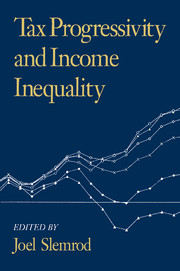Book contents
- Frontmatter
- Contents
- Preface
- List of contributors
- 1 Introduction
- 2 Trends in federal tax progressivity, 1980–93
- COMMENTS
- 3 The lifetime incidence of state and local taxes: measuring changes during the 1980s
- COMMENTS
- 4 Trends in income inequality: the impact of, and implications for, tax policy
- COMMENTS
- 5 The efficiency cost of increased progressivity
- COMMENTS
- 6 On the high-income Laffer curve
- COMMENTS
- 7 Tax progressivity and household portfolios: descriptive evidence from the Survey of Consumer Finances
- COMMENTS
- 8 Progressivity of capital gains taxation with optimal portfolio selection
- COMMENTS
- 9 Perceptions of fairness in the crucible of tax policy
- COMMENTS
- 10 Progressive taxation, equity, and tax design
- Index
COMMENTS
Published online by Cambridge University Press: 20 May 2010
- Frontmatter
- Contents
- Preface
- List of contributors
- 1 Introduction
- 2 Trends in federal tax progressivity, 1980–93
- COMMENTS
- 3 The lifetime incidence of state and local taxes: measuring changes during the 1980s
- COMMENTS
- 4 Trends in income inequality: the impact of, and implications for, tax policy
- COMMENTS
- 5 The efficiency cost of increased progressivity
- COMMENTS
- 6 On the high-income Laffer curve
- COMMENTS
- 7 Tax progressivity and household portfolios: descriptive evidence from the Survey of Consumer Finances
- COMMENTS
- 8 Progressivity of capital gains taxation with optimal portfolio selection
- COMMENTS
- 9 Perceptions of fairness in the crucible of tax policy
- COMMENTS
- 10 Progressive taxation, equity, and tax design
- Index
Summary
Three questions must be addressed in any discussion of tax progressivity. Why do we care? Assuming we do care, what is the empirical evidence on progressivity, both across taxes and over time? Finally, given this evidence, are we concerned by what we see, and if so, what can be done about it? In these comments, I shall offer answers to these three questions using Gib Metcalf's careful, and innovative, look at the progressivity of state and local taxes.
First, why do we care about tax progressivity? Progressivity is a descriptive device to summarize the allocation of the burdens of a tax code. We care about progressivity because we care about the allocation of tax burdens, and tax burdens matter for two reasons: economic efficiency and economic fairness. As a descriptive device, however, the concept of progressivity – and its many numerical realizations – has been focused primarily on the task of describing economic fairness. We use other analytic devices to describe economic efficiency: namely, the logic of “excess burdens.” We care about tax progressivity and its measurement because we care about economic fairness.
I raise this all-too-obvious point about tax progressivity as a measure of economic fairness because to me it seems to be of particular relevance to the discussion of tax progressivity in the state and local sector – in particular, how we understand and use progressivity measures for one important state and local tax, the local property tax.
- Type
- Chapter
- Information
- Tax Progressivity and Income Inequality , pp. 89 - 94Publisher: Cambridge University PressPrint publication year: 1994



